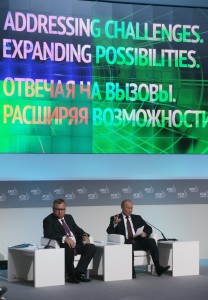Politics, territorial spats weaken Asia-Pacific resolve

Russian President Vladimir Putin, right, speaks during a plenary session at the APEC summit in Vladivostok, Russia, Friday, Sept. 7, 2012. At left is APEC CEO Summit Chairman Andrey Kostin.(AP Photo/Mikhail Metzel)
VLADIVOSTOK—Asia and Pacific leaders meeting in the Russian seaport of Vladivostok this weekend urgently need to push ahead with their agenda for freer trade. Faltering vital signs in China and elsewhere suggest the global recovery may depend on it.
The Asia Pacific Economic Cooperation (Apec) forum aims to foster growth by dismantling barriers and bottlenecks that slow trade and business, while nurturing closer economic ties. But election-year politics and territorial spats are weakening the resolve of its 22 members to put aside differences for the sake of regional vitality.
Given its status as an organization governed by consensus, Apec is not known for major policy breakthroughs.
This year is particularly challenging: From the Kuril islands to the northeast of Vladivostok all the way to the Spratlys in the West Philippine Sea (South China Sea), various neighbors are squabbling over territories at a time when they most need to be focused on promoting growth.
South Korea is feuding with Japan, Japan with China, China with many of its Southeast Asian neighbors. With elections due soon in South Korea and Japan, and a once-in-a-decade change in the Communist Party leadership pending in China, lame-duck leaders facing nationalist pressures at home have little room for amicably resolving the disputes.
“It’s bad luck that it happens just before all these transitions. Everybody is looking around and saying, ‘these people won’t be at the table in three months,’” said William Overholt, an Asia expert at Harvard University’s Kennedy School of Government.
“The omens are not auspicious,” he said.
As expected, on Thursday Apec finance ministers issued a declaration noting the crucial role the region plays in driving world growth and, as usual, their commitment to more open trade and investment.
The sharp decline in growth in trade this year—from 12 percent in December from a year earlier to 4.6 percent in May—underscores the importance of pushing ahead with trade initiatives, the Apec Policy Support Unit, an independent data analysis and research unit, said in a report issued on Friday.
“Apec is really focused on trade and commercial facilitation, but this year these guys are mainly playing to the home crowds. These things are impacting what can possibly be done in Vladivostok,” said Tony Nash, managing director at IHS Global Insight in Singapore.
As hosts, Russian leaders are showcasing their country’s recent entry into the rules-setting World Trade Organization—a key step in traditionally Europe-centric Moscow’s effort to build trade and investment ties with its neighbors in the Far East.
“What I’d expect from the meeting is Russia trying to show itself to be a global power, and certainly my view and that of many others is that is not true anymore,” said Xenia Dormandy, an expert at the London-based think tank Chatham House.
US President Barack Obama’s decision to skip this year’s gathering—Secretary of State Hillary Clinton is representing the United States—allows Russia greater leeway to shape its agenda, said Peter Drysdale, a professor emeritus at Australia National University who helped set up Apec back in 1989.
“After a long time sitting on the sidelines, the Russians have thrown considerable diplomatic firepower into working up a strong Apec agenda, with a focus on food security, getting trade barriers on environmental goods down and expanding visa-free travel by business people within Apec,” Drysdale said in a commentary on the website East Asia Forum.
Like last year’s Apec venue, Obama’s hometown of Honolulu, Vladivostok is a remote outpost, with beaches and military garrisons.
There the similarities end: Though US officials say they are keen to ensure the ambitious agenda rolled out in Hawaii is implemented, the momentum from Obama’s “Aloha Apec” appears to have fizzled.
Since last year’s summit, Canada and Mexico have gotten the go-ahead to join nine other nations involved in talks on forming a US-backed free trade bloc known as the “Trans-Pacific Partnership (TPP).” But participants have yet to reach their goal of setting a legal framework this year for the initiative, and Japan, its leaders preoccupied with tax reforms and domestic politics, has so far been unable to join the negotiations.
“Japan is not in a position to move ahead. It’s very difficult for the Japanese government to deal with this right now,” said William Overholt.